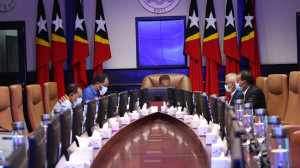3rd Meeting of the Commission for Coordination and Monitoring of Institutional Reforms

The Prime Minister, Taur Matan Ruak, chaired, on March 21st, 2022, at the Government Palace, in Dili, the 3rd Meeting Commission for Coordination and Monitoring Institutional Reforms (CCARI Portuguese Acronym), created by the Government Resolution no. 29/2020 of August 19th.
In addition to the Prime Minister, the commission comprises the Ministers responsible for guiding the implementation of each of the four major institutional reforms underway – the Public Administration Reform (PAR), the Tax and Public Financial Management Reform (RFGFP, Portuguese acronym), the Judiciary Reform (JR), and the Decentralization Process (DP).
These four reforms are interconnected and have the common goal of improving the way the public sector is managed and functions, as well as ensuring that the State operates within a framework of legality and effective legal security and more efficiently and effectively.
The meeting was also attended by the Minister of the Presidency of the Council of Ministers, Fidelis Manuel Leite Magalhães, who assists the Prime Minister in the overall coordination of institutional reforms, and is responsible for the Public Administration Reform, the Minister of Finance, Rui Augusto Gomes, responsible for the Tax and Public Financial Management Reform process, the Minister of Justice, Manuel Cárceres da Costa, who leads the Judicial Reform, and the Vice-Minister of State Administration, Lino de Jesus Torrezão, responsible for the Decentralization Process.
The mission of this coordinating commission is to set the overall direction and vision of the reforms or programmes, coordinate the consistent design, programming and implementation of the reforms, promote synergies and cooperation between the reforms, remove obstacles and overlaps between the reforms, provide political support for the reforms and ensure good performance and timely implementation of the reforms.
During the meeting, besides sharing information on the evolution of the processes of each reform, it was also sought to find answers to the challenges encountered and make the necessary decisions for the improvement of each reform process.
Public Administration Reform (PAR) aims to transform public administration, with a focus on central government structures. The PAR aims to improve service delivery processes, strengthen accountability and performance incentives, improve human resource management and development, review public administration functions and structures, and improve administrative services to citizens and businesses.
The Tax and Public Financial Management Reform (RFGFP, Portuguese acronym) aim to improve budgets, including their preparation, transparency and execution. This reform should ensure greater value for money in financial management and service delivery, decentralise and improve procurement, financial and asset management and improve revenue mobilisation and collection.
Judiciary Reform (JR) aims to strengthen the judiciary system and other institutions involved in the provision of justice.
The Decentralization Process (DP) aims to strengthen local and municipal political accountability and good governance, transfer functions and responsibilities from the Central Government to sub-national administrations, develop mechanisms for fiscal decentralization and revenue collection from own sources, and improve the management and administration of Municipalities.










































